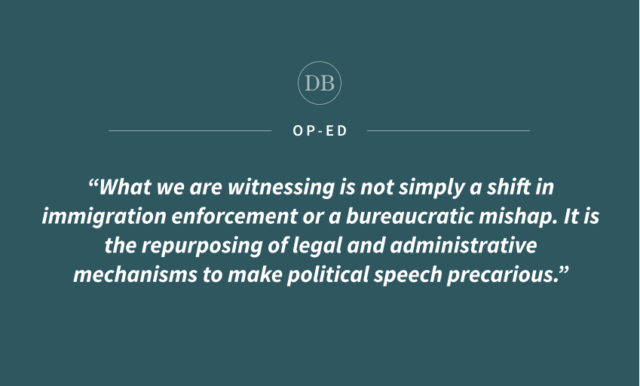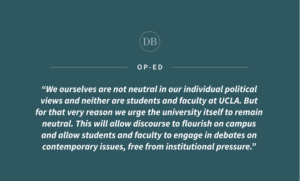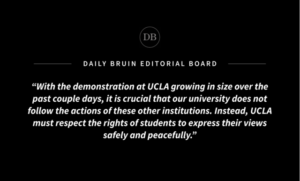This post was updated April 15 at 8:01 p.m.
When federal agents in plainclothes abducted Tufts University doctoral student Rümeysa Öztürk off the streets of Somerville, Massachusetts, they didn’t just detain one person.
They attacked a foundational tenet of American democracy: the protection of dissenting speech.
Öztürk, a former Fulbright scholar and international student, was transferred across state lines in direct violation of a court order, according to her legal team.
She was held incommunicado for nearly 24 hours. She suffered a serious asthma attack while in the custody of federal authorities. At no point was she charged with a crime. So why did this happen to her?
The justification, stated by Secretary of State Marco Rubio, was unambiguous: Öztürk’s supposed offense lay in the act of thinking aloud in the public sphere.
Rubio’s anti-university rhetoric reflects a deeper contempt for the very essence of academic freedom – not merely the freedom to study but the freedom to think. Öztürk was allowed to study but not to think politically.
She could learn – but not dissent or organize. She could be in the classroom – but not on the streets.
Rubio’s statements, coupled with the administrative violence evident in this case, reveal a troubling reality in today’s America: One may be welcomed as a student yet punished for becoming a thinker.
Universities remain open to those who study in silence, but their constitutional protections begin to recede when thought gives rise to speech – especially political speech – and when students dare to act as dissidents.
What happened to Öztürk is therefore not an isolated injustice, nor is it simply a matter concerning international students. It is a rupture in the political fabric that binds universities to democratic life. What is under attack is not just a visa status.
It is the very principle that higher education should protect: the freedom to think, question and speak.
Öztürk’s detention is thus a warning to every student who learns, every professor who teaches and every institution that claims to protect critical thought.
So let us dispense with illusions. This is not an immigration story. This is a democracy story.
What this episode reveals is a logic of governance that seeks to suppress dissent at its roots, particularly when it emerges from those who are young, racialized and politically articulate.
What we are witnessing is not simply a shift in immigration enforcement or a bureaucratic mishap. It is the repurposing of legal and administrative mechanisms to make political speech precarious.
The message is meant to circulate. It is meant to instill fear, to isolate, to warn.
This pattern is neither accidental nor unfamiliar. Authoritarianism seldom declares its arrival openly. It begins with the quiet normalization of punishment for dissenting thought. I say this not from abstraction but from experience.
I grew up and studied in Turkey, where constitutional protections eroded slowly at first, then all at once, amid declining democracy and rising authoritarianism. I studied at Boğaziçi University in Istanbul and Central European University in Vienna, both targeted by antidemocratic governments seeking to silence dissent in the name of national unity or cultural purity.
The playbook was familiar. First, a person’s views are framed as beyond the limits of acceptable discourse – labeled terrorist, traitor, enemy or a threat to the nation, regardless of their actual content or context.
Then, when their rights are violated, few speak out, fearing the same fate. What follows is not merely the suffering of an individual but the quiet spread of fear, the internalization of silence and the retreat of intellectual life from the public world.
However, a crucial difference remains in the United States. Unlike in Turkey, where the judiciary long ago ceased to serve as an effective constraint on executive power, courts in the U.S. still possess the institutional strength to prevent a political administration from transforming into an authoritarian regime. And they are, for now, exercising that strength.
But that power is not inherent – it must be actively maintained, or it will recede. This means that while the judiciary has so far remained independent in the U.S., its ability to function as a check on power depends on the surrounding political culture and on whether society continues to uphold the rule of law as a shared democratic value.
This brings us to a deeper and more unsettling question: the role of universities.
In times of political pressure, universities ought to stand as the most visible guardians of civil liberties, not only for their own communities but for the preservation of the broader political culture on which judicial independence depends.
They are, by nature and by purpose, spaces where free inquiry and dissent are not merely tolerated but cultivated.
Yet, increasingly, we see them turning inward. When confronted with political risk, they choose containment. They prioritize reputational safety, donor satisfaction and the appearance of neutrality. This is dangerous.
What, then, is required? UCLA, and the entire UC system, must affirm that legal and administrative tools cannot be weaponized to punish political expression.
Otherwise, they abandon the very mission that grants them legitimacy: the defense of thought against power and the refusal to let fear dictate the boundaries of what may be said or studied.
If we begin to permit exceptions in the name of institutional caution or funding panic, we risk dismantling the very structures meant to protect us. What slips away in such moments is not easily reclaimed.
Faculty and students alike must resist the reflex to weigh the content of a person’s speech before deciding whether their rights deserve protection. To do otherwise is to accept a standard in which due process is granted not as a right but as a reward.
We do not need to agree with Rümeysa Öztürk to insist that she be treated justly.
A recent amicus curiae brief submitted by 27 American Jewish organizations in support of Öztürk’s habeas corpus petition made that point especially clear.
“While many Amici may disagree with the substance of Öztürk’s statements, they firmly stand behind her right to voice her dissent,” the brief said.
That is precisely the test. If we limit our defense of speech to that which confirms our preferences, we do not defend liberty – we curate opinion.
But the Constitution is not built on preference. It is built on the conviction that certain rights are inalienable – even, and especially, when they are inconvenient.
That conviction is being tested now. And silence will not protect it.
Beren Azizi is a doctoral student in gender studies at UCLA.





Comments are closed.